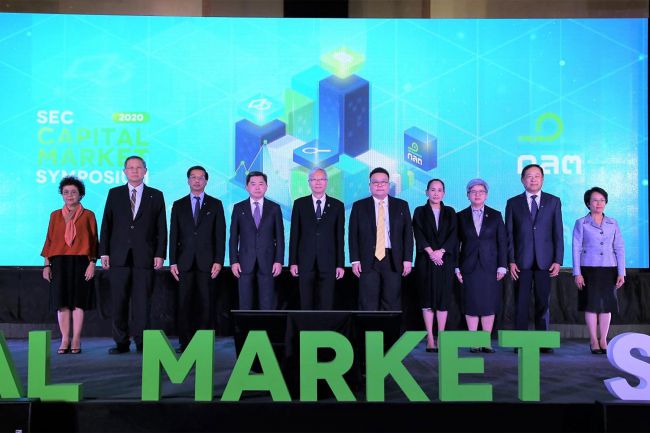Critical capital market challenges outlined
2 min read
Pichit Akrathit, chairman of the Securities and Exchange Commission, centre left, and Ruenvadee Suwanmongkol, SEC secretary-general, third right, along with senior executives at the opening ceremony of the SEC Capital Market Symposium 2020.
Thai capital markets face four pending challenges going forward, referring to SEC-R (sustainability, equality, competitiveness, and resilience) pressured by the ‘five Ds’ (debt, division, divergence, digitalisation, and degradation of the environment), said the keynote speaker at the 2020 Capital Market Symposium, hosted by the Securities and Exchange Commission (SEC).
DEBT ACCUMULATION
The historic surge of public debt-to-GDP is the first megatrend aggravated by the global pandemic. Developed countries’ public debt surged following World War II, while many developing countries went on to break the historical high, said Santitarn Sathirathai, group chief economist and managing director at Sea.
The debt spike is now causing “two lows and two highs,” in which the interest and growth rate are restrained while debt and the baht surged because of low investment.
DIVISION AND DIVERGENCE
The pandemic has also stymied poverty reduction. According to Krungsri Research on 470,000 companies, about 30% of Thai companies would suffer tight liquidity in 2021. Of these, 90% are small-and-medium-enterprises (SMEs), Mr Santitarn said.
“SMEs and low-income individuals’ ability to reach financial sources, such as banks, is limited due to their lack of collateral assets or a regular income. Therefore, the government’s measures are still significant.”
One key challenge is how to help those in ‘vulnerable’ groups to reach sources of funding, he said.
The global economy is diverging between the East and West. Asia is in better shape than the rest as China is implementing its dual circulation policy and the “China+1 model” with an aim to become the global consumer market, a position currently occupied by the US.
ENVIRONMENTAL BOOST
Digitalisation is the fourth trend. Thailand’s digital economy still has room to grow by an average of 25% per year from 2020 to 2025. The growth will drive the real economy as digitalisation in many sectors such as commerce, agriculture, financial and capital are attached to the real sectors.
“The regulators and policies should take advantage of the trend to lubricate or strengthen the recovery of the real economy,” he said.
Many countries will also focus on investment in Environmental, Social and Corporate Governance as part of the effort to decelerate environmental degradation, which represents the fifth trend.
SEC-R CHALLENGE
“The digital economy is competing on an ‘ecosystem’ that requires cooperation from all stakeholders to make capital markets sustainable. The SEC as the market regulator has a vital role in making it happen.”
Equality is the second challenge as the system must serve both the capital side, fundraisers and borrowers, and the market side, or savers, to enable suitable investment while empowering underserved borrowers and savers by adopting technology to help reduce investment costs and create new investment asset types.
Mr Santitarn said capital markets must encourage competitiveness by finding a new growth engine for digital infrastructure.





